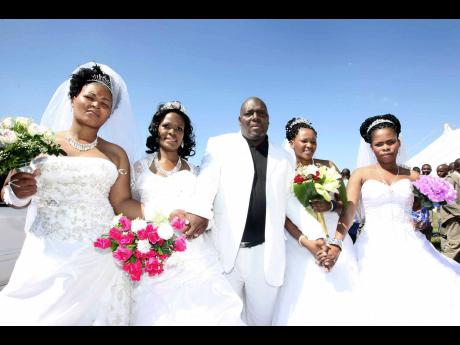The case for polygamy
It is the intention of the Islamic Council of Jamaica (ICOJ) to invite the Government of Jamaica to consider going a step further in making further changes in the matrimonial law to allow limited polygamy, subject to very strict guidelines.
The preference expressed in the law for monogamy is also the preferred standard expressed in Islam because no man can be absolutely fair and just between two or more women. However, the need to maintain standards of decency and morals in the society has necessitated the authorisation of a conditional and limited degree of polygamy.
Jamaica is facing and suffering not just financial, commercial, economic, political and administrative difficulties, but also societal and domestic issues. Those of a domestic nature play a significant role in the degeneration of the family structure and values. The evident decay of the Jamaican family structure, and the ever-mounting and complex array of domestic issues, provide strong proof that the domestic model mentioned below, which is at the core of the collapse, is clearly not working.
It is the responsibility of a wise government to seek alternatives and not to permit or foster counterproductive legislation that criminalises an activity in which the majority of the people indulge. It is, therefore, just, fit, and proper - and a reasonable proposition - that the Government of Jamaica should decriminalise polygamous marriage contracts on the basis that polygamous marriages: (i) are inherently good; (ii) they perpetuate the family as the core social building block; (iii) are crucial to social stability; and (iv) the vast majority of Jamaicans have, de facto, precisely that kind of domestic partnership arrangement.
CHRISTIAN LAWS
Having regard to the fact that it is the Christian morals that have, of late, influenced and shaped the law and cultural traditions of this country, the ICOJ appreciates that this is a very difficult decision for the Government. However, the example set by Prophet Abraham, the spiritual and moral father of the three major religions (Islam, Judaism, and Christianity), is strong authority and a valid religious precedent on which to rely.
What the ICOJ is urging the Jamaican Government to do is not only consistent with the highest standard of civilisation, but also vastly superior to what currently prevails. Jamaica already has a de facto polygamous society; all that is required is recognition of that truth.
Under the present law, what currently prevails, as the Jamaican social and domestic family model, is a blend of monogamy mixed with:
(a) Fatherless, one-parent families; and/or
(b) The horrid, brutal and undignified degradation of women who are compelled by circumstances and/or intimidated and physically forced by their oppressors to take to the streets and prostitute themselves or have children with different men as a means of survival.
The present legislation puts many women in need of a mate into a state of indignity by leaving them with no available or viable moral option of finding a suitable candidate:
(1) Where the male's current and valid marriage contract places a second woman at a disadvantage by using it as the excuse for keeping her in a
position of indignity and within an immoral
confinement;
(2) Where the male's current marriage has broken down irretrievably, but the complexity of the case and the waiting period for obtaining a decree absolute and divorce means that the new relationship cannot be legitimised;
(3) The male or female candidate is ready and willing or is already involved in a new relationship but cannot get married to his or her partner owing to the absence of a settlement of the financial issues in the divorce.
Jewish and Christian morality dictates, and the right-minded individual will agree that it is more virtuous to enter with sincerity into wedlock and then separate than to partake in the fornication or adultery of a temporary arrangement.
It is not possible for this country to have the Islamic polygamous framework because it is predominantly Christian. Within the Islamic polygamous framework, the safeguards and the benefits from a polygamous marriage arrangement are even greater, born out of the belief in Islam that the husband holds his wife/wives on trust and is accountable to the all-powerful Creator for the manner in which he treats them, and provides for his family.
FEAR OF THE CREATOR
A Muslim husband would, therefore, fear having to account to the Creator for not looking after his family; leaving a wife hanging by always being with another of the wives; and treating the women unfairly and not equally (though they do not have to be treated the same).
However, it is possible to have a well-regulated, secular polygamous arrangement that provides many of the benefits of the Islamic polygamous framework and is, therefore, preferred to the present mixed monogamous model. It would:
- Impact upon prostitution;
- Provide a stricter legislative and enforcement framework for identifying paternity and enforcing parental responsibilities;
- Reduce the possibility of incestuous relationships;
- Facilitate the attainment of the virtue in 'wanting for your sister what you want for yourself';
- Provide a framework of a stable family structure for all the children of the marriage and not just a few;
- Reduce the need for extramarital affairs;
- Allow for greater efficiency in the use of the people resources within the family;
- Foster greater productivity in the society through cooperation and a single-unit family structure;
- Reduce sexually transmitted infections because the source of any such problem is narrowed down;
- Provide greater openness and trust, and dishonesty would play a lesser role in the breakdown of marriages.
These are some of the obvious benefits. Therefore, in the interest of this country's future moral and social well-being, the ICOJ would invite the Government to take on board its just, proportioned and workable proposal, and it remains available to offer its support and assistance.
- Al-Hajj Mekaeel Maknoon is acting emir. Email feedback to columns@gleanerjm.com and mmaknoon@al-mutaqeenftja.com


